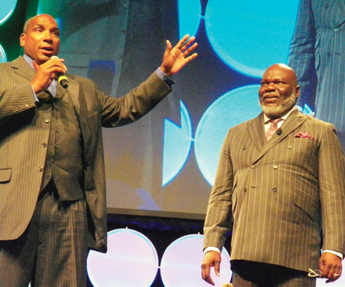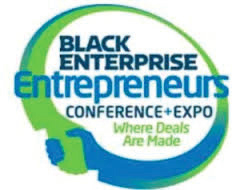A better way to do business
By Starla Muhammad -Assistant Editor- | Last updated: Jun 6, 2014 - 8:07:11 PMWhat's your opinion on this article?

L-R, Earl “Butch” Graves, Jr., President and CEO of Black Enterprise and Bishop T.D. Jakes. Bishop Jakes spoke on his business success and was one of many presenters at the Black Enterprise Conference in Columbus, Ohio. Photo: Starla Muhammad
|
Over 1,000 established and budding entrepreneurs and business leaders attended the three-day gathering to gain valuable information, sharpen their business acumen and more importantly, to network with one another.
“We believe that African American businesses need to partner with one another so that they can grow in size and scale. One to gain corporate contracts but two, to serve our community better,” said Derek T. Dingle, senior vice president and editor-in-chief of Black Enterprise. Small business is big business, he added. “Join the Small Business Revolution,” was the theme of the 2014 conference.

|
According to figures released in 2011 by the U.S. Census in a survey of Black businesses from 2002-2007, only 3.1 percent of Black-owned fi rms made more than $250,000 a year in receipts. The majority or 26.5 percent made $10,000 - $24,999 and 21.4 percent grossed between $5,000-$9,999.
“We need to think differently because if we partner, grow our businesses and scale up then we can have a greater impact in terms of employment,” said Mr. Dingle. The Black community is still in the midst of an employment crisis, one that successful Black businesses can help address. But as one presenter pointed out, “Would you rather own 100 percent of a grape or 25 percent of a watermelon?” meaning partnering up with one another as opposed to sole proprietorships is an option Black entrepreneurs should be willing to consider.
“What’s going to make the difference are going to be African American businesses of size and scale that can employ large numbers of African Americans,” said Mr. Dingle. This will translate into building wealth and creating opportunities throughout the community as well, he added.
Teaching entrepreneurs a better way to operate more efficiently through the use of technology, whether it is marketing goods and services via social media or delving into business ownership through franchising, were among the various breakout sessions at this year’s conference.
Successful and multi-million dollar Black business owners and executives presented on topics at the mid-May conference on, “Mastering Multiple Franchise Ownership,” “Wealth Management: How to Grow, Protect and Distribute Your Assets,” “How I Used Social Media to Brand My Company”, “20/20 Business Forum: Get On the Shelf” and multiple sessions on raising and accessing capital. The popular Elevator Pitch Competition in which entrepreneurs got the opportunity to present their business plan and idea to a panel of judges was back this year in addition to auditions for the popular network show Shark Tank.
Founded by Earl Graves Sr. in 1970, Black Enterprise is a multimedia resource hub providing information, training and tools for Black business owners and executives. Its signature publication, Black Enterprise Magazine highlights and promotes Black owned businesses. In 2006 Mr. Graves Sr., handed the reigns over to his eldest son, Earl “Butch” Graves, Jr., who is now President and CEO.
Guest presenters throughout the conference included author and multimedia businessman T.D. Jakes, longtime civil rights pioneer Rev. Jesse Jackson, Sr. who spoke on the ongoing fight for Blacks to gain entrance into Silicon Valley’s tech industry and Valerie Daniels-Carter, co-founder, president and CEO of V & J Holdings, one of the largest Black and women owned fast-food franchise operators in the country.
There must be a total transformation of the traditional Black entrepreneur mindset, said Rodney Sampson, author of Kingonomics and Executive in Charge of Diversity and Inclusion for Shark Tank in a presentation during the first night of the conference.
Mr. Sampson said Blacks not only need to start, build and sell companies but another method of business is to invest in companies.
“Everybody wants to be an entrepreneur but that’s a mindset, a process and a commitment that most people are not willing to make…we must see ourselves as investors first,” said Mr. Sampson. Investing in startup businesses provides different opportunities to build wealth, become an entrepreneur and help others, he said.
“Culturally, we start companies that have a nice lifestyle. We have lifestyle businesses whereas other communities they are passionate about ideas but they’re not so much connected to the company itself,” said Mr. Sampson.
Selling a company to a larger or more strategic firm is a way to create wealth, a job for yourself and others he pointed out.
“Are you in business simply to create a livelihood for yourself or are you creating something that’s so disruptive that it will change the past, present and future and someone will eventually want to purchase or buy this from you because they have to have it. And guess what, now that you have the money, you’re also free to innovate again and again,” said Mr. Sampson.
Attendees gained a wealth of knowledge during the conference they hoped to take back home to implement into their businesses.
Ellis Still, owner of The Burning Bush Christian Bookstore travelled from Newark, N.J. to attend the conference and said it was well worth it.
“Coming to the Black Enterprise Conference you really get a chance to hear from people that have either done it at a very high level in terms of their success. So it’s good to hear from a diversity of people that have done what you’re trying to do,” Mr. Still told The Final Call.
Manual Washington, owner and CEO of two companies based in West Virginia, Groves Cleaning Services, LLC and Janitors Closet, had previously attended several Black Enterprise Conferences but had not been to one recently. Though he has been Photos: Starla Muhammad in business 28 years, Mr. Washington said this year’s conference brought him up to the 21st century.
“I had become somewhat complacent with the marketplace thinking that everything’s still to a point where it’s fair. It’s not a fair market but listening to Rev. Jakes and Rev. Jackson, I’ve found that we still have a fight and a struggle to get a better part of the market regardless to whatever type of business we’re in,” he told The Final Call.
“To do that we must be persistent and have got to continue to persevere to the struggles of being entrepreneurs. By doing that, we must work together as a people and these types of conferences that forms a networking and informational stage for us, we must be a part of that and try to be stronger in our struggle to be owners or entrepreneurs.”
Look for more conference coverage in upcoming editions of The Final Call.
INSIDE STORIES AND REVIEWS
-
-
About Harriett ... and the Negro Hollywood Road Show
By Rabiah Muhammad, Guest Columnist » Full Story -
Skepticism greets Jay-Z, NFL talk of inspiring change
By Bryan 18X Crawford and Richard B. Muhammad The Final Call Newspaper @TheFinalCall » Full Story -
The painful problem of Black girls and suicide
By Charlene Muhammad -National Correspondent- » Full Story -
Exploitation of Innocence - Report: Perceptions, policies hurting Black girls
By Charlene Muhammad -National Correspondent- » Full Story -
Big Ballin: Big ideas fuel a father’s Big Baller Brand and brash business sense
By Bryan Crawford -Contributing Writer- » Full Story






 Click Here Stay Connected!
Click Here Stay Connected!








